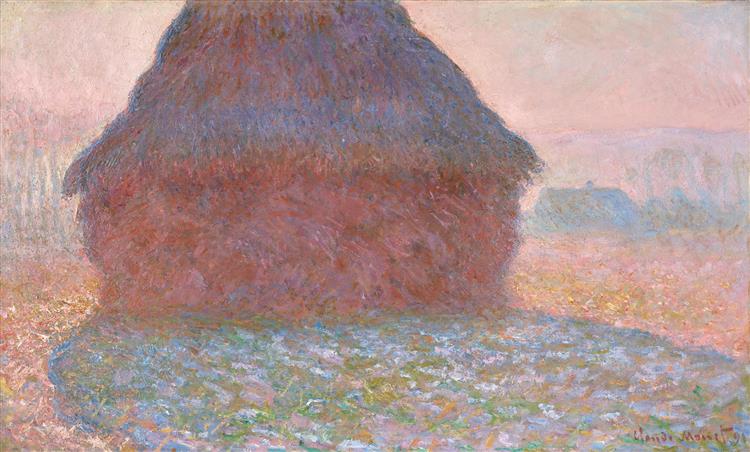תיאור
In Claude Monet's 1891 painting "Grain Under the Sun", the viewer is presented with a sublime display of the light and texture that characterizes the Impressionist master's work. This painting is one of many examples Monet created around the series of haystacks, a theme that allowed him to explore the interaction of natural light and shapes in the French rural landscape. The work is not only a portrait of a landscape, but a study of the effects of the sun on color and atmosphere.
The composition focuses on a huge pile of hay stacked in the centre of the image, which seems almost to vibrate in the sunlight. Monet manages to give this figure three-dimensionality, using loose brushstrokes that configure the mass of the grain, allowing the viewer to perceive its volume. The background, an expanse of sown field, blends into the sky, shining through a palette rich in yellows and golds that evoke the heat of summer. This chromatic choice not only reinforces the sensation of light, but also establishes a dialogue between the natural environment and the work itself, encapsulating the essence of Impressionism.
Colour plays a central role in the painting. Monet uses a variety of yellow and green hues to describe the countryside, creating a harmonious contrast with the ochre colour of the haystack. These tones are intensified by the use of light, which seems to bathe the scene, creating an almost ethereal effect. As sunlight filters through, hard edges are removed, bringing the work to life. Shadows, more subtle than one might expect, play a tiny but significant role, adding depth and dimension to the space.
Monet is renowned for his ability to capture the essence of an ephemeral moment. In "Grain Under the Sun," he manages to condense time and the experience of being in that place on a sunny day. The work may seem devoid of human figures, but it is not devoid of a sense of life. Nature itself, represented by the grain and the surrounding landscape, becomes the protagonist of the pictorial narrative. Grain, traditionally a symbol of harvest and abundance, can also be interpreted as a meditation on the passage of time and permanence in a world that is constantly changing.
This painting is part of a larger series Monet made at this time, where he explored different conditions of light and weather. His almost obsessive focus on a single subject demonstrates his interest in the everyday environment and his ability to elevate those encounters to an almost spiritual level in art. The index of similar works, such as "Haystack, Sunset" or "Haystacks in the Snow," reveal an evolving narrative about his relationship to the landscape and an engagement with nature in its many variations.
In conclusion, “Grain Under the Sun” is a testament to Claude Monet’s mastery in the use of color, light, and form. His impressionistic style not only captures a moment in nature, but invites the viewer to immerse themselves in the sensory experience that this dwarfed and vibrant landscape offers. The work continues to resonate not only as a milestone in Monet’s career, but also as a joyous celebration of the ephemeral beauty of rural life.
KUADROS ©, a famous painting on your wall.
Hand-made oil painting reproductions, with the quality of professional artists and the distinctive seal of KUADROS ©.
Painting reproduction service with satisfaction guarantee. If you are not completely satisfied with the replica of your painting, we will refund 100% of your money.

